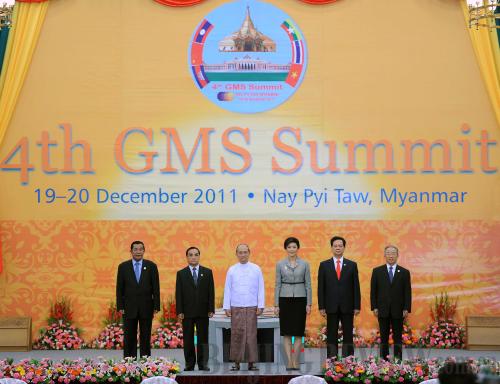|
 |
|
COOPERATION: Chinese State Councilor Dai Bingguo (first right) attends the Fourth Greater Mekong Sub-region Summit in Nay Pyi Taw on December 20, 2011, along with other regional leaders (LI TAO) |
China donated $1 million and supplies worth 80.6 million yuan ($12.7 million) after Thailand was hit by its worst floods in more than 50 years in 2011.
Xi placed great hopes on young people to carry forward the traditional friendship between China and ASEAN countries. In both Thailand and Viet Nam, he underlined the importance of their role in boosting cooperation.
"Promoting practical cooperation, especially economic cooperation, is another highlight of Xi's visits," said Tang. China has become the largest trade partner of ASEAN and one of its major foreign investors, while ASEAN is China's third largest trade partner.
Xi reiterated China's willingness to advance cooperation during the visits. Together with Vietnamese and Thai leaders, Xi attended the signing ceremonies of more than 10 documents on cooperation in various fields including trade, finance, law, health, press and disaster relief.
In recent years, Sino-Vietnamese economic and trade cooperation has made strides. China has been Viet Nam's largest trade partner for seven years in a row. Sino-Vietnamese trade volume reached $35.67 billion in the first 11 months of 2011, up 35.2 percent year on year, according to China's Ministry of Commerce.
When China and Viet Nam normalized their relations in 1991, their trade volume was about $30 million. The rapid rise shows both sides have a strong interest in economic and trade cooperation, and potential for Chinese investment in Viet Nam remains huge, said Luqiu.
While meeting Vietnamese officials, Xi stressed the need to cement Sino-Vietnamese business ties for win-win results. The two sides should strive to boost their trade volume to $60 billion by 2015, he said.
The Thai Government voiced its eagerness to seek an increase in bilateral trade, investment and tourism. China and Thailand agreed to ink a deal on a five-year plan of trade and economic cooperation as soon as possible, while proposing a trade volume target of $100 billion by 2015.
Trade between China and Thailand reached $59.44 billion from January to November 2011, up 24.4 percent year on year. China is the largest export market of Thailand and the second largest source of the country's imports.
On December 22, 2011, upon Xi's arrival in Bangkok, the People's Bank of China, China's central bank, signed a 70-billion-yuan ($11.06 billion) currency swap agreement with the Bank of Thailand, aiming to enhance financial cooperation, promote trade and investment and ensure regional financial stability.
"The deal could help reduce the over-dependence on the U.S. dollar in bilateral trade, and was welcomed by Thai businessmen doing business with China," said Luqiu.
Also in December 2011, Chinese State Councilor Dai Bingguo attended the Fourth GMS Summit in Nay Pyi Taw, Myanmar. The GMS group, established in 1992, consists of China, Cambodia, Laos, Myanmar, Thailand and Viet Nam.
Dai put forward new proposals on GMS cooperation, such as building well-connected highway and railway networks and working together in environmental protection, agriculture, science and technology. He also reached agreements with the leaders of Myanmar.
Myanmar, previously ruled by a military regime, is currently in transition to a civilian government. Myanmar's stability is of great importance for China partly because of China's heavy investment in the country, said Tang. In talks between Dai and Myanmar's leaders, the two sides reaffirmed their commitment to close relations and economic cooperation.
Email us at: yulintao@bjreview.com | 